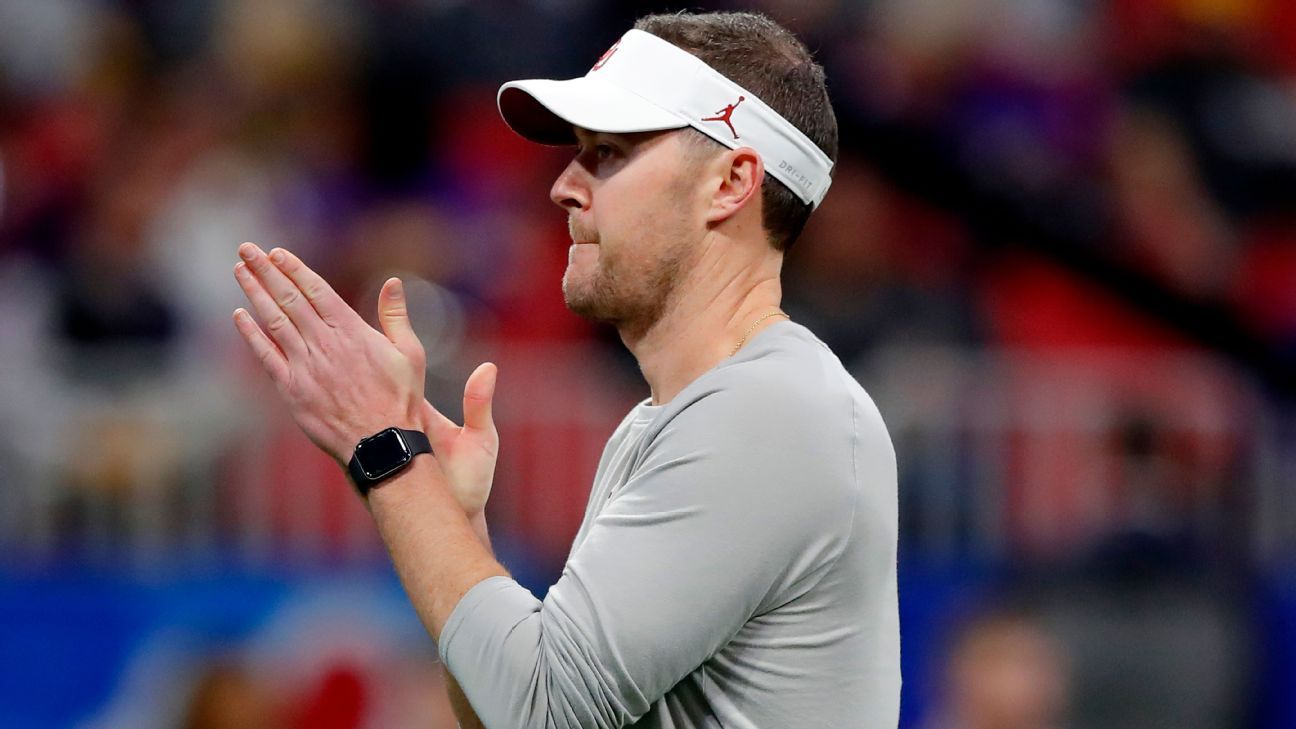Oklahoma coach Lincoln Riley said Saturday that his team had nine players test positive for COVID-19 from the team’s latest round of testing on Friday.
The testing was following the team’s return from a break that Riley gave the team on Aug. 8, allowing the players to go home after it became evident that Oklahoma’s scheduled Aug. 29 season opener would be pushed back into September and the uncertainty that surrounded the future of the college football season last weekend.
“Disappointed about the news, obviously,” Riley said. “We’ve done such a tremendous job really this entire time. Certainly, you know when you give your players some time, there is risk in that.”
In addition to the nine positives, Riley said “a relatively small number” are also being isolated because of contact tracing. He said they’ve been able to trace back every one of the positives to “community-based infections.” He said when he gave the team time off, “over 75% of our team didn’t leave Norman.”
“The area that our team has got to do a better job on when we’re not here,” Riley said, referring to the team facilities. “And we’ve known forever that that that was going to be the major concern.”
The Sooners have been one of the model programs nationally when it has come to managing coronavirus spread within its team. Riley was one of the last to bring his team back to campus for voluntary workouts, choosing to do so July 1, two weeks after the Big 12 allowed teams to do so.
After announcing 14 positive tests in the initial round of testing when the team returned for July 1 workouts, the Sooners only had one positive player test in the next five weeks, including a four-week span from July 8-29 with zero positives. From July 1 to Aug. 8, the Sooners conducted 700 player tests, resulting in only 15 positives. Out of 186 tests of staff, only two have tested positive. The combined player and staff positivity rate of 1.9% in that five-week span was well below the state of Oklahoma’s, which has been above six percent during the same time span and at one point reached as high as 10%. The state’s seven-day rolling average positivity rate was 8.9% through Friday, according to the state’s health department.
Riley said he gave the team time off because he didn’t want training camp going on too long after the change in schedule.
“It’d be pretty easy for me to say right now that I regret it,” Riley said of his decision to let the team return home. “I also feel like if I keep a team pinned up here for a six- or seven-week training camp I probably would regret that too.”
Riley, in noting that the two largest rounds of positive tests his team has had were the result of the team returning to campus from home, underscored the anxiety that comes with a key hurdle college football has to clear when it comes to having a season: the return of regular students to college campuses nationwide.
“I think that’s the concern of every single college football coach in the country right now,” Riley said. “How is that managed, because you know the numbers game becomes much more difficult.”
But it also strengthened Riley’s confidence in the school’s protocols, given how much they’ve minimized positive tests when the Sooners have conducted organized team activities.
“It’s an opportunity for us to continue to learn to educate ourselves because the reality is this isn’t the NBA, this is college football,” Riley said. “We can try to minimize this risk as much as we possibly want, but we’re never going to eliminate them 100 percent. We don’t have a bubble. And so we get that we’re all gonna have to continue to work to do a better job on all accounts. We’re still very confident in the plan that we’ve had.”
The Sooners have been practicing in masks throughout training camp, something Riley said they’ll continue to do. He said they’ve experimented with different types based on player feedback and that if it was up to him, they would wear them in games.
“We haven’t received much guidance on … what’s going to be required [for games], but if given up to us, we’re going to have our faces covered, some way, somehow,” Riley said. “Because, again, the health of the student-athlete being priority No. 1 and there’s no replacement for having a mask or something that acts as a mask on at any point. So that’s why we’ve been stressing it both on the practice field and anywhere else.”
Riley stressed that continuing to follow health and safety protocols and being vigilant when not on campus is going to be key to whether college football can get through a season without interruptions.
“I think it’s a sense of reality for us and what we’re going to be up against,” Riley said. “And I think what we’re up against is something that’s doable, but … how well can this virus be mitigated when players and staff members are not in these facilities? Everybody wants the 100 percent, risk-free thing and if you don’t have a true bubble, that’s not possible.
“I see a clear vision of how we get there, but we’ve got to do it and this highlights how important it is. It may end up being one of the determining factors of the season, if we are able to play the season and complete the season or not, and we’ve all got to do our part.”
